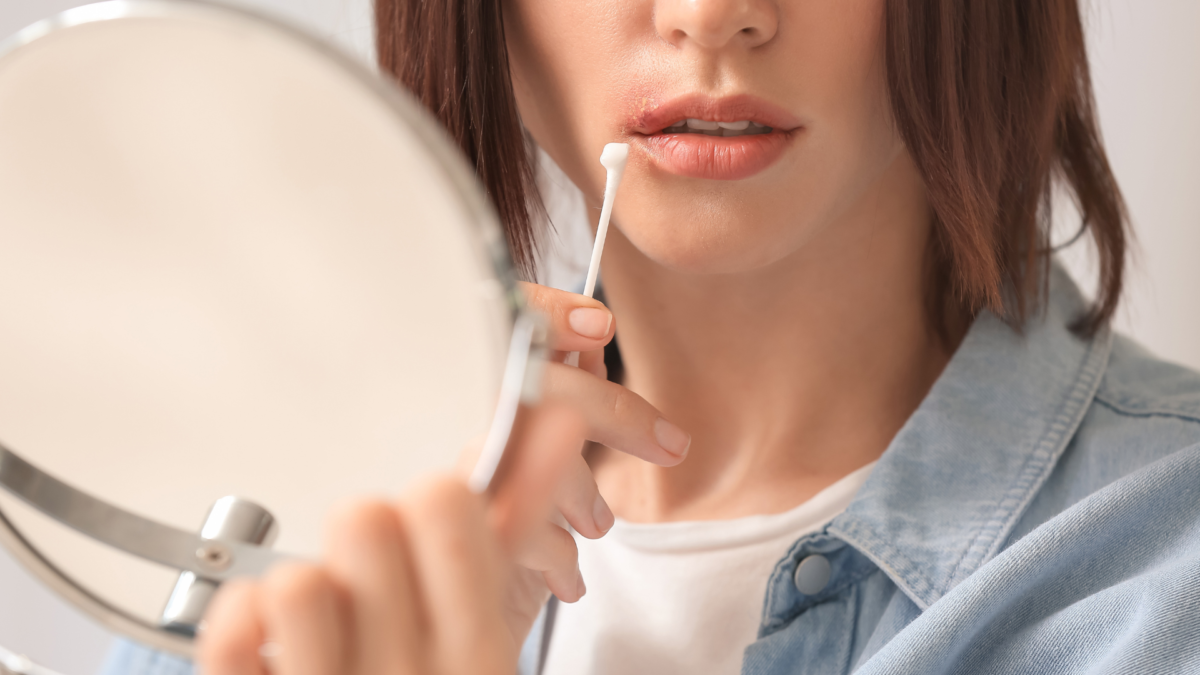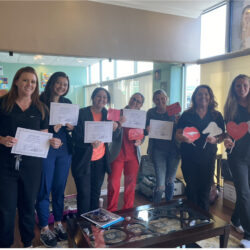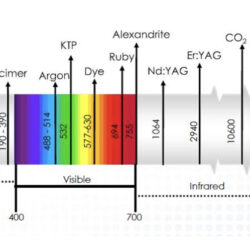A fun discussion on Facebook went like this:
Initial Question: For those of you whose offices have a laser to treat a herpes outbreak or potential one, how much do you charge?
Elaine with Dental Laser Integrations: Use Palliative Code, charge similar to your LBR fee, or give complimentary on good will 🧡 this treatment is a HUGE practice builder
FB User: Elaine Rdh do you wear N95 masks and true goggles when you do this? The risk of nasal and eye infection are real. There used to be a group called Infection control with a twist. The moderator posted a picture of the nasal eruption she had from not wearing these. Our laser manufacturer rec this. Is the patient wearing goggles? Are you considering the Fitzpatrick scale for people with more melanocytes in their skin and the risk of hyperpigmentation? My derm actually asked me this? They have patients with no active herpes take Valtrex for 48 hours before they do corrective laser therapy. We had a long talk….he was the one asking the questions and giving me the low down on the patients he sees with hyper or hypo pigmentation after they are “inappropriately lasered” His word not mine. Just wondering what you do to protect yourselves and the patient’s eyes and nose.
Elaine: FB User it was a Practice Management question – not about safety. You seem to be very well informed. You should teach a class!
FB User: Elaine Rdh I’m really not at all. I just had a series of skin cancer sessions and my derm thru out all these questions and I had zero answers. So he gave me his two cents worth. I was just trying to see what others are doing since the derm community is seeing repercussions of laser care in dental offices specifically for herpes. I literally went in for three chemo light sessions and he laid out his concerns. Since the topic was lasers and you said you do it, wondered what you do. I did a dive on social media and found some articles. Then I forgot about it until I saw this post. It’s a rant page so we don’t have to stay on a specific topic. It’s one of the reasons I love this group. We do laser as well but very seldom. I am not the provider for that since it’s a CO2 laser. I was truly wondering what is being done in offices
( Elaine is kinda bitchy, no? )
Elaine: Yeah, let’s keep the convo going! I’m assuming you take your Dermo to be a subject matter expert in lasers? Sounds like their concerns are for hyper / hypo pigmentation corrections in regards to the epidermal / facial tissues — or were they towards the oral mucosa? What type of lasers is your dermo using, and for which areas? There are laser treatments now able to work with patients with darker skin (Fitz Scale) such as the pico laser, there are more invasive ablative treatments like Fractional, and less invasive / non ablative treatments like PhotoFacials. I remember meeting someone on a plane once who said their Dermo totally burned them with their laser—his way of saying poor technique and over treatment — it happens in all disciplines, including dentistry. Typically dentistry will consider the F Scale but it’s not a final determinant as it is in Derm. Yes a Level 3 Mask is the standard recommendation although 0.2 micron works just as well – which is the dentistry minimum standard for general procedures that produce aerosols. Goggles that match the working beam of the laser the operator is using — also a laser safety mandate and industry minimum standard. As you know, not all wavelengths are harmful to the eye, like diodes. You are a CO2 office: depending on your state, you can use any laser as long as it’s within the scope of your practice and as long as the dental laser regulations, as written in state dental board language, does not dismiss it. Ideally, we know the laws of our state, and on our website we outline most state references in regards to laser laws.
There are 4 main ways we see laser lesion therapy implemented:
1. Dismiss the patient due to aforementioned risks
2. Treat with non ablative diode light
3. Use an Erbium or CO2 on a laser bandaid setting to superficially cauterize it
4. Treat with an effective beam and include an additional Rx. Studies show more and more drug resistance. It would be good to treat the lesion with laser only to see how they do, and one might find that providing an additional Rx is not necessary.
FB user: does your office RX Valtrex and rec LLysine for future outbreaks to get ahead of the virus and prevent the lesion from surfacing?
End convo. ( Or at least that’s where I tapped out. ) Most schools teach to not treat these types of lesions at all, but in the real world, dismissing a patient resulting in NO SERVICES RENDERED may lead to more practice philosophy discussions, questioning the providers judgement, and in turn, the provider questioning the owner’s standard of care.
What does the research say?
- Although potent agents against herpesvirus infections have become available during the last decade, the increasing clinical use of acyclovir and famciclovir has been associated with the emergence of drug-resistant herpesvirus strains (Reusser 1996).
- This study also aimed to evaluate the effect of diode laser on treatment of patients with herpes labialis compared with acyclovir. The low level laser therapy (LLLT) significantly decreased the healing time, and pain intensity compared to acyclovir and turned-off laser groups, which is consistent with previous studies.
- The key question regarding the practical implementation of any treatment method is to understand the rules for its use. It is well known that combined LLLT methodologies are the most efficient; however, the optimization of their parameters is nearly always individually tailored. For instance, when using LLLT concomitantly with pharmaceuticals, the most common questions are about drug dosage form and route of administration. According to a number of reports, with the presence of a skin rash, exposure of LILI on the site with applied antiviral ointment (active substance — acyclovir)65,66 is the most effective method. In contrast, results from the RCT, which included 60 subjects over 16 years old, show that, irrespective of virus type (HSV-1 or HSV-2) and lesion localization (facial or genital area), the clinical efficacy of either laser illumination (wavelength 633 nm, power 20 mW) locally or acyclovir orally was not different. But the best results could be achieved using a combination of both methods.67
For initial procedures, the optimal exposure time is within the first 24 hours of the onset of virus reactivation. However, in the case of laser application, on the second day after infection, only acyclovir “works”; that is, laser light no longer has a potentiating effect, whereas if illumination is started during the first four hours, only laser light will ensure a reliable result with no medication use.68
Key Takeaways:
- Know your risks, hazards, and safety parameters for the exact laser you are using, tissue interaction.
- Know the lesion in question, its virulence, cycle, symptomatology and etiology.
- Decide if you want to implement and treat, dismiss, or refer out – there is no right or wrong, to each their own. Just decide, and be prepared to defend your treatment philosophy and align it to the philosophy of your supervising doctor.
- Decide if you want to implement laser therapy and also prescribe an anti-viral.
- Ensure the dental professional has the proper knowledge, skill and training to safely and effectively treat the patient. This could be a dentist, dental hygienist, and in allowing states, the dental assistant.
- Ensure you have the proper knowledge and communication skills to safely and effectively educate the patient.
To some dental professionals, treating an active herpetic lesion is taboo, risky and an ethical dilemma. To other dental professionals, treating with non-invasive, naturotherapeutic photo-therapy (diode laser) is the greatest thing since sliced bread. Great discussion! Please let us know your position in the comments!
Elaine Rodriguez, Founder – Dental Laser Integrations
Hashtags:
#laser dentistry #laser lesion treatment #laser research #dental laser laws #laser therapy #laser perioddontal therapy #laser hygiene
Links to Laser Laws by State and Free CE on our Youtube and Laser Research Folder:
Laser Laws: https://dentallaserintegrations.com/faq/
Lasers and Lesions Free 1CEU: https://youtu.be/9qoZYP_NAu8
See it on Tik Tok: https://www.tiktok.com/t/ZTRTo2dLP/
Laser Research Compiled: Diode Laser Research
References:
1.Low-Intensity Laser Therapy is an Effective Treatment for Recurrent Herpes Simplex Infection. Results from a Randomized Double-Blind Placebo-Controlled Study
Journal of Investigative Dermatology Volume 113, Issue 2, August 1999, Pages 221-223
https://www.sciencedirect.com/science/article/pii/S0022202X15405652
2. Comparing the effect of diode laser against acyclovir cream for the treatment of herpes labialis. J Clin Exp Dent. 2017 Jun; 9(6): e729–e732.
Published online 2017 Jun 1. doi: 10.4317/jced.53679
https://www.ncbi.nlm.nih.gov/pmc/articles/PMC5474325/
3. Moskvin SV. Low-level laser therapy for herpesvirus infections: a narrative literature review. J Lasers Med Sci. 2021;12:e38. doi:10.34172/jlms.2021.38.
______
Elaine Rodriguez, Founder of Dental Laser Integrations



